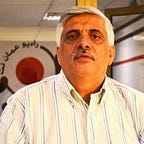Arabs were mesmerized by America’s democratic resilience
By Daoud Kuttab
Something strange happened in the Arab region this week. People followed closely the final legal decision-making process of the electoral college and were mesmerized by the strength of American democracy. The widely followed BBC Arabic program Nuqtat Hewar (on radio, tv, and social media) engaged with audiences throughout the Arab region with many expressing their amazement at the way the American people and the U.S. institutions withstood an authoritarian takeover attempt. Some, however, have noted the lack of resolve by both democrats and republicans when it came to supporting democratic aspirations around the world.
Having been badly hurt by a fumbled Arab spring that turned bad, a decade ago this month, Arab youth are still looking up to America as a role model for democracy, rule of law, freedom of expression, and assembly.
In Egypt, parliamentary elections took place on November 7th, but press reports from Cairo said that many Egyptians didn’t even know that elections were taking place in their country while they were riveted watching every tiny detail of the elections and their aftermaths in the US.
Oraib Rantawi a political expert told an Amman panel that Jordanians similarly followed the U.S. elections much more than the parliamentary elections that took place at about the same time in Jordan.
The Palestinians were fixated on the elections noting that Biden by far is the lesser of the two pro-Israeli nominees. While Joe Biden has a trail of pro-Israeli statements and positions, Palestinians felt that no one could be as bad for their struggle for freedom and independence more than Trump who moved the U.S. embassy to Jerusalem, refuses to use the term occupied territories for areas Israel militarily took over in 1967 and cut off aid to Jerusalem hospitals treating Gaza cancer children and the UN refugee agency as well as water and other infrastructure programs. Even the political bazaar of rewarding countries in return to please Israel did little to douse the joy many people felt after the electoral college announced the official validation of the will of the American people.
Interest in the American elections went far beyond the foreign policy positions of the two candidates. While many government (especially in the Gulf and Egypt) leaders preferred Trump’s re-election, the public had a totally different choice. Public interest was focused on the potential damage that Donald J. Trump had caused to US democracy and the rule of law. It wasn’t hard to imagine that human rights in their own countries will worsen if Trump was re-elected.
The average Arab person compared Trump to authoritarian leaders that they are familiar with, in the Middle East. The attack on the press as the enemy of the people early on in the Trump administration was seen by many as a green light for authoritarian regimes to crack down on their own dissidents. The brutal killing of Washington Post Saudi columnist Jamal Khashoggi might have been the most visible of these cases but jails throughout the region were full of journalists and prisoners of thought and consciences as Trump declared Egypt’s military ruler his “favorite dictator.”
According to the Vienna-based International Press Institute over 60 journalists are behind bars, one of them, Mohammad Monir died from Covid and another Al Jazeera reporter has been held in an Egyptian jail for over 400 days without charge or trial.
Refusing to accept the will of the people was completely normal for peoples used to authoritarian regimes using various legal and illegal methods to knock out their political opponents and suppress voters from carrying out their rights to freely choose their representatives. Declaring that they are the winners irrespective of the facts is something that most people in the Middle East are familiar with.
Perhaps the most telling similarity in the post-election attitudes of a wide sector of political leaders was the way they publicly supported the losing candidate and the incitement that such false support filters down to the public and creates a herd of people and officials who bow down to the person in power regardless of the results of elections.
The role of American democratic institutions especially the judiciary in rebuffing attempts to hijack the public’s choices was also a major source of public interest. In the Arab region, the judiciary’s independence is questioned by many who feel the courts are a tool of the executive branch despite lip service to the opposite.
The majority of the population of the Middle East and North Africa are under 35 years old. Most of these young men and women are connected and exposed to world opinions, US pop culture, and censorship-free media. They are happy to see democracy and democratic institutions have won the day and overcome an autocratic leader who has fought tooth and nail to stay in power, just like most of their own rulers who seem to be in power, along with their children, for life.
^^^^^^^^^^^^^^^^^^^^^^^
Daoud Kuttab is an award-winning journalist and former Ferris Professor of Journalism at Princeton University. Follow him on twitter@daoudkuttab
